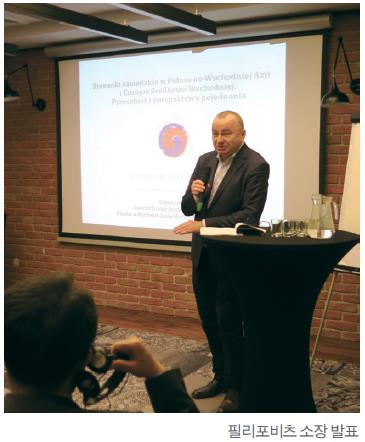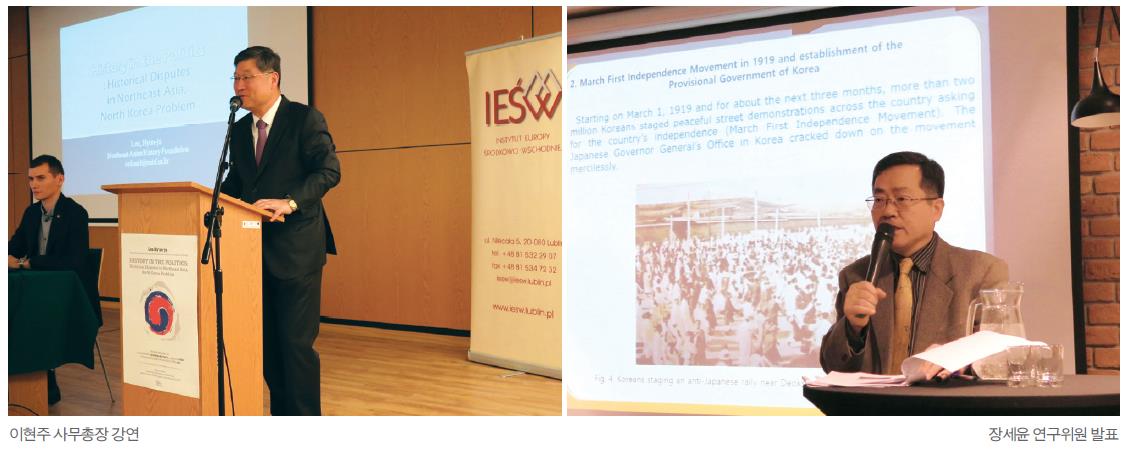동북아역사재단 2018년 01월호 뉴스레터
- Kim Jong-hak (Research fellow, NAHF Institute of Japanese Studies)

A Juxtaposition of Korean and Polish Experiences
NAHF research fellow Kim Jong-hak’s presentation on “19th Century Western International Law and Japan’s Colonization of Korea” pointed out that Japan began to strictly follow the rationales of Western international law since the Meiji Restoration, which is why its invasion of Korea took advantage of Western international law and imitated the way Western powers acquired colonies. The background to inserting the phrase “independent state” (自主之邦) in the 1876 Korea-Japan Treaty and Japan’s 1894 interpretation of that phrase as a “sovereign, independent state” hints that Japan had been well aware at the time of the amoral nature of power politics. This was, according to Kim’s argument, the reason Japan would use vague wording to draft treaties when it wasn’t powerful enough and later take its own spin on such wording once it became diplomatically powerful enough to do so. Through his presentation “Characteristics and Significance of Korean Independence Movements: Ways to View the History of Korean Independence Movements,” NAHF research fellow Chang Se-yun outlined the characteristics of each phase of Japan’s colonial rule of Korea as well as those of the Korean Provisional Government’s activities. According to Chang, the significance of Korean independence movements to the world lies in the fact that they played a leading role in liberation movements at colonies around the world and helped protect Korea’s native culture in the face of Japan’s cultural annihilation policies. They were also meaningful for taking place in diverse forms nearly anywhere populated by Koreas, for forming solidarity with other struggles for anti-imperialism and the liberation of weak ethnic minorities, and for having the Korean Provisional Government play a symbolic as well as a pivotal, actual role in carrying out independence movements.
Professor Piotr Głuszkowski of the University of Warsaw introduced the process through which Poland lost its sovereignty to Russia from being divided into three partitions in the late 18th century. Głuszkowski’s presentation “The Partitioning and Rule of Poland: With a Focus on Russia” pointed out that the main cause behind Poland’s downfall was because the parliamentary procedure called liberum veto had weakened the king’s power and allowed neighboring countries, especially Russia, to interfere in its domestic affairs. After the first partition, all sorts of bills for reform were submitted to the “Four Years’ Sejm” (four-year parliamentary session), but conservative Polish nobility who feared radical change resisted by getting Russian forces involved, which caused Poland to undergo a second partition at the hands of Russia. The next presentation titled “The November Uprising and January Uprising: The Journey to Independence” by Professor Wiesław Caban of Jan Kochanowski University provided an introduction to the backgrounds and developments of the November Uprising of 1830 and the January Uprising of 1863 along with an analysis on why they failed. Although the two uprisings differ in that the former escalated into an all-out war between Poland and Russia, whereas the latter took place in the form of guerrilla warfare, both uprisings failed from relying too heavily on the aid of other western European countries. Nevertheless, Caban argued that the two uprisings managed to contribute to Poland’s independence in 1918 by instilling in the Poles a sense of nation.
Ways to Resolve Historical Disputes
Mirosław Filipowicz, director of the Institute of East-Central Europe, emphasized the need to differentiate history as fact and historical descriptions as narrative through his presentation “A History of Improving and Aggravating International Relations.” Filipowicz claimed that believing an unquestionable historical truth can be awarded from a single explanation is no more than placing a blind faith in positivism. According to Filipowicz’s argument, the first step toward historical reconciliation is to be able to acknowledge the interpretational differences that may occur between historians due to the different viewpoints they each take. The presentation “Historical Conflicts Between Korea and Japan and Efforts for Reconciliation” by Nam Sang-gu, director of the NAHF Institute of Japanese Studies, covered the true nature of historical conflicts between Korea and Japan as well as the history of efforts made for reconciliation over the past six decades. Under the current lack of mutual trust between the two countries, Nam suggested that the solution to historical conflicts may lie in conducting more in-depth comparative studies which review and assess Japanese perceptions of history and Japan’s efforts to apologize, make reparations, and resolve conflicts in comparison to similar cases in other countries.
Doctor Marek Radziwon of the Institute of East-Central Europe presented on “Historical Conflicts between Poland and Russia and Efforts for Reconciliation.” After introducing several issues between Poland and Russia in understanding twentieth-century history, Radziwon predicted that it may be difficult to achieve historical reconciliation unless Russia’s authoritarian regime changes since true reconciliation is only possible through social dialogues, not state initiatives. Professor Kim Yong-deog of Hankuk University of Foreign Studies' Department of Polish gave a presentation on “Historical Conflicts between Poland and Germany and Efforts for Reconciliation.” After covering the fifty-year history of Poland and Germany’s joint compilation of a common history textbook, Kim emphasized that Germany's admission of and brutal self-reflection over its responsibility for past atrocities and Poland's gestures of showing the willingness to forgive were crucial to achieving historical reconciliation between the two countries.
Ahead of the aforementioned conference presentations, NAHF Secretary General Lee Hyun-ju offered a special lecture on "History in Politics: Historical Disputes in Northeast Asia and the North Korea Problem" to about 200 students of the John Paul II Catholic University of Lublin. English-language editions of "Historical Issues and Peace in Northeast Asia" and "Dokdo: The Korean Island in the History of Korea and Japan" published by NAHF were handed out to the audience after the lecture. The papers NAHF research fellows presented at the conference are to be published in a special issue of the English-language yearbook published by the Institute of East-Central Europe. And to build upon the progress made through the conference and continue academic exchange with Polish scholars, the Northeast Asian History Foundation plans to host another conference in 2018 to discuss the theme "East Asian and European Decolonization Movements and Historical Reconciliation."



